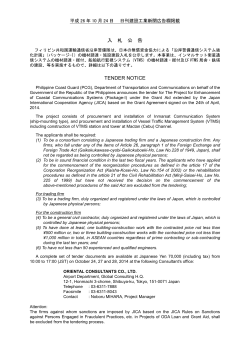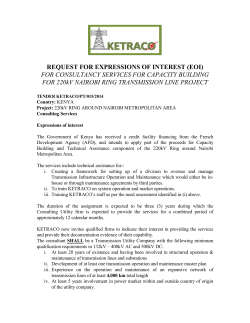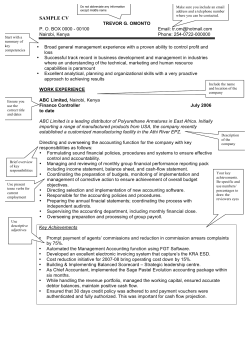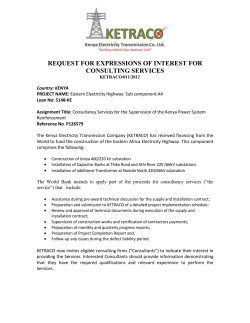
ANNOUNCEMENT REGIONAL TRAINING COURSE ON THROUGH SOCIAL FORESTRY
ANNOUNCEMENT REGIONAL TRAINING COURSE ON ADAPTATION TO CLIMATE CHANGE IN AFRICA THROUGH SOCIAL FORESTRY 19th January - 20th February 2015 General Information INTRODUCTION It is increasingly recognised that climate change is evidently impacting on the natural resources and livelihoods as well as other social and economic activities that depend on tree and forest products and services in Africa. It is also apparent that it is growing faster than our collective efforts can solve it. The complex nature of the recurrent and emerging challenges, implies that no single solution approach would suffice but a multi-dimensional strategy should be used. It is also recognised that the challenges continue to create additional demands for capacity development and the need to work through more comprehensive partnerships. Therefore, the urgency to adopt and implement effective and comprehensive solutions to climate change in Africa through forestry and allied natural resources management practices is inevitable. Communities will more than ever before continue to demand and also depend on the collective and individual commitments to invest in solutions that can help them to adapt to climate change issues. Social forestry still stands out as a multi-dimensional avenue to provide the communities in Africa with the measures and motivation to invest in their environment. Japan International Cooperation Agency (JICA) and the Government of the Republic of Kenya through the Kenya Forestry Research Institute (KEFRI) in collaboration with at least 17 countries in eastern, central and southern Africa will continue cooperate with each other to build capacity through a series of regional training courses and follow-up visits on “Adaptation to Climate Change in Africa through Social Forestry” (hereinafter referred to as “the Course”) under JICA’s Third Country Training Programme (TCTP). The Regional Training Course on Adaptation to Climate Change in Africa through Social Forestry comes after successful implementation of four previous phases and 19 courses, namely: Regional Training Course for the Promotion of Social Forestry in Africa (1995-2004), the Regional Training Course on Enhancing Adoption of Social Forestry in Africa (2005-2008) and the Regional Training Course on Mitigating Climate Change in Africa through Social Forestry (2009-2014). To-date, a total of 415 participants from 20 countries in eastern, central and southern African countries have been trained. During this Phase (2014-2018), and subject to consultations, KEFRI in collaboration with JICA plans to conduct a total of five (5) courses, thus once a year, with each course lasting five (5) weeks. All courses will be held be held in October/November every year apart from the first course, which will be held from 19th January - 20th February 2015. 1 KEFRI in collaboration with JICA is therefore, announcing the 1st Regional Training Course on “Adaptation to Climate Change in Africa through Social Forestry”. The Course will be held at KEFRI Headquarters in Muguga, Kenya, and conducted in accordance with the following conditions: 1. TITLE The Course will be entitled “Adaptation to Climate Change in Africa through Social Forestry”. 2. PURPOSE The capacities of participating countries to implement adaptation measures to climate change are enhanced through participatory social forestry extension methodologies. 3. MODULES The course will consist of two modules to be implemented alternately, namely: 3.1 Forestry Farmer Field School extension methodology and livelihood. 3.2 Adaptation to climate change and livelihood. 4. OUTPUTS At the end of the Course, the participants are expected to: Module 1: 1.1 Fully acquired knowledge and skills to practice forestry farmer field school social forestry extension methodology. 1.2 Enhanced their knowledge and ability to promote practical livelihood and resilience activities. 1.3 Enhanced their knowledge and skills to promote farmers incentives for participation in community based conservation and management through local organizations. 1.4 Developed practical action plans including monitoring and evaluation based on their country and institutional policies, strategies and plans. Module 2: 2.1 Enhanced their knowledge on climate change and development issues (including REDD+) at global, regional and local level. 2.2 Acquired knowledge and skills to select, promote, cultivate and support conservation of drought tolerant trees. 2.3 Improved their capacity to facilitate sharing of information on adaptation to climate change and livelihood through participatory social forestry extension methodologies. 2 2.4 Acquired practical skills to prepare and implement practical action plans that will lead to improved livelihood activities. 5. DURATION The duration of the course will be five (5) weeks and the course for JFY 2014 (hereinafter referred to as “the 1st Course”) will be held from 16th January to 25th February 2015. 6. CURRICULUM The Course curriculum will cover the two (2) modules and include topics ranging from policy and institutional issues and measures on adaptation to climate change and development; participatory social forestry extension methodology (with specific reference to FFS) and livelihood; case studies, research on drought resilient tree species, and implementation of action plans, including monitoring and evaluation. 7. PARTICIPATING COUNTRIES This Phase will retain as many countries as possible so as to build on forestry farmer field school social forestry extension methodology, conservation of drought tolerant species, and adaptation to climate change. However, each module will focus on inviting specific participating countries based on the need and demand. The governments/organisations invited to nominate applicant(s) for the course will be from the following 17 countries: Botswana, Burundi, Ethiopia, Kenya, Lesotho, Malawi, Mozambique, Namibia, Rwanda, Somalia, Sudan, South Sudan, Swaziland, Tanzania, Uganda, Zambia and Zimbabwe. 8. NUMBER OF PARTICIPANTS The number of participants from the participating countries including Kenya shall be twenty-two (22) per year. The number of Kenyan participants per course shall not exceed three. However, nominating countries can nominate and sponsor additional suitably qualified candidates at their own cost or other sponsorship. 9. QUALIFICATIONS FOR APPLICANTS Applicants for the Course should: 9.1 Be citizens of the nominating countries. 9.2 Be nominated by their respective governments/ organizations in accordance with the procedures provided in 12 herein. 9.3 Be B.Sc./ Diploma holder or have an equivalent academic background in forestry or allied sciences. 9.4 Be presently engaged in planning and implementation of environmental conservation, climate change and livelihood activities. 3 9.5 Be staff of institutions that are directly involved in the planning and implementation of environmental conservation, climate change and livelihood activities. 9.6 Have practical experience of at least three (3) year in service. 9.7 Be under forty five (45) years of age 9.8 Have a good command of spoken and written English (ensure that your hand written and signed application form is legible), and, 9.9 Be in good health, both physically and mentally to complete the Course. 10. IMPLEMENTING AGENCY The Course will be implemented in Kenya by the Kenya Forestry Research Institute (KEFRI). 11. PROCEDURE FOR APPLICATION 11.1 The Governments/organizations invited to nominate applicant(s) for the Course shall forward two (2) copies of the Prescribed Application Form for each nominee to the Government of the Republic of Kenya through diplomatic channels not later than sixty (60) days before the commencement of the Course. One (1) copy should also be forwarded to the JICA offices in the participating countries (or JICA office responsible, if there is no office in the participating country). 11.2 The Government of the Republic of Kenya through KEFRI will inform the nominating Governments/organizations through diplomatic channels, and the JICA offices in the participating countries (or JICA office responsible) by letter, whether or not the applicant(s) has/have been accepted to the Course, no later than thirty (30) days before commencement of the Course. Within that period also, a summary of information on all the applicants accepted should be sent to the JICA Kenya Office. 12. MEASURES TO BE TAKEN BY THE GOVERNMENT OF THE REPUBLIC OF KENYA AND JICA In organizing and implementing the Course, the Government of the Republic of Kenya through KEFRI and JICA will take the following measures, respectively in accordance with the relevant laws and regulations in force in Kenya and in Japan; (1) Finance the expenses necessary for conducting the Course, excluding the expenses financed by the Government of Japan. (2) Issue certificates in consultation with the JICA Kenya Office to the participants who have successfully completed the Course. (3) Submit a course report to the JICA Kenya Office within forty-five (45) days after the termination of the Course. (4) Submit an official breakdown report of expenditure for verification thereof within forty-five (45) days after the termination of the Course. (5) Co-ordinate all matters related to the Course. 4 13 13.1 SPONSORSHIP JICA in collaboration with KEFRI will finance the expenses necessary for conducting the Course. This will include: (a) Expenses for international economy-class flight tickets, stop-over expenses, accommodation, per diem (approximately US$ 25 per day) payable in Kenya shillings, particularly for daily meals, telephone, laundry and other incidentals) and medical insurance premiums for participants as appropriate (NB: field sessions are demanding, therefore, one must be physically fit). (b) Expenses for honoraria for external lecturers, arrangement of study tour(s) and textbook development for lecturers, consumables, meetings, etc. (c) Expenses for training of participants as facilitators in FFS extension methodology. (d) Any other expenses in accordance with JICA’s and KEFRI rules and regulations. 13.2 (1) PARTICIPATING COUNTRY/ORGANISATIONS To bear the following: 1. Cost of dispatching application or acceptance documents or reports to KEFRI by postal or courier services as necessary. 2. Expenses incurred by participants in their countries while preparing to attend the training, e.g. local travel, passport, visa and accommodation. 3. Airport Tax at every port of departure or entry where applicable. 4. Seek official approval from the course organisers if you have to make arrangements to secure a flight ticket in your country within two (2) days of receiving a Letter of Invitation to the Course. 5. Cost of preparing country reports (electronic and print). 6. Should attach passport size photographs on the Application Forms. 13 OTHER INFORMATION 1. Kenya Forestry Research Institute (KEFRI) headquarters is located about 25 km northwest of Nairobi at an altitude of 2,073 m above sea level. The average annual rainfall is 1,540 mm with major rainy season in the months of April-June and minor rains in October-November. Because of the relatively high altitude, participants are advised to bring some warm clothing, particularly for the night. 2. The participants are requested to arrive in Nairobi on 17th or 18th January 2015 as per the E-ticket to be sent directly to them based on the address (es) provided in their Application Form. 3. On arrival at Jomo Kenyatta International Airport in Nairobi, the participants are requested to comply with the following arrival procedures: (i) When port clinic, quarantine, immigration and customs clearance procedures have been completed, the participants will be met by a KEFRI official at the Arrival Terminal carrying a placard with the name of the training course and KEFRI. (ii) Those who will be arriving on flights other than originally booked 5 should inform KEFRI prior to their departure. (iii) The participants are required to strictly observe the Laws of Kenya. (iv) The participants are required to strictly follow the course schedule. (v) Requests to extend the period of stay in Kenya cannot be accepted. (vi) The participants are requested to follow the return trip schedule designated by JICA/KEFRI. 4. Dependants of the participants are not entitled to any provision of expenses and services mentioned above. The participants are therefore, advised not to bring any dependants. 14. CONTACTS 14.1 Kenya Forestry Research Institute (KEFRI) 1. Mailing Address (DHL or other Courier Services) The Director Kenya Forestry Research Institute (KEFRI) Social Forestry Training Centre (SFTC) P.O. Box 20412 00200 Nairobi KENYA Attention: The Training Manager 2. Telephone +254 722 157 414 +254 734 251 888 +254 20 2010651/2 +254 733 850 391 3. E-mail director@kefri.org michaelmukolwe@yahoo.com / mmukolwe@kefri.org 14.2 Japan International Cooperation Agency (JICA) Kenya Office 1. Mailing Address (DHL or other Courier Services) The Chief Representative JICA Kenya Office Rahimtulla Trust Towers 10th & 11th Flr Upper Hill Road P.O. Box 50572 – 00200 NAIROBI Kenya E-mail Jicaky@jica.jo.jp 15 APPLICATION DEADLINE Duly completed Application Form(s) should be received by 28th November 2014. 6 Guidelines of Application Form for the JICA Training and Dialogue Program The attached form is to be used to apply for the training and dialogue programs of the Japan International Cooperation Agency (JICA), which are implemented as part of the Official Development Assistance Program of the Government of Japan. Please complete the application form while referring to the following and consult with the respective country’s JICA Office - or the Embassy of Japan if the former is not available - in your country for further information. 1. Parts of Application Form to be completed 1) Which part of the form should be submitted? It depends on the type of training and dialogue program you are applying for. >Application for Group and Region Focused Training Program Official application and Parts A and B including Medical History and Examination must be submitted. >>Application for Country Focused Training Program including Counterpart Training Program Part B including Medical History and Examination will be submitted. Official application and Part A need not to be submitted 2) How many parts does the Application Form consist of? The Application Form consists of three parts as follows: Official Application This part is to be confirmed and signed by the head of the relevant department/division of the organization, which is applying. Part A. Information on the Applying Organization This part is to be confirmed by the head of the relevant department/division of the organization, which is applying. Part B. Information About the Nominee including Medical History and Examination This part is to be completed by the person who is nominated by the organization applying. The applicants for Group and Region Focused Training Program are required to fill in every item. As for the applications for Country Focused Training Program including Counterpart Training Program and some specified International Dialogue Programs, it is required to fill in the designated “required” items as is shown on the Form. Please refer to the General Information to find out which type the training and dialogue program that your organization applies for belongs to. 2. How to complete the Application Form In completing the application form, please be advised to: (a) carefully read the General Information (GI) for which you intend to apply, and confirm if the objectives and contents are relevant to yours, (b) be sure to write in the title name of the course/seminar/workshop/project accurately according to the GI, which you intend to apply, 7 (c) use a typewriter/personal computer in completing the form, of which the electronic version is available on the web site: http://www.jica.go.jp/, or write in block letters, (d) fill in the form in English, (e) use or “x” to fill in the ( ) check boxes, (f) attach a picture of the Nominee, (g) attach additional page(s) if there is insufficient space on the form, (h) prepare the necessary document(s) described in the General Information (GI), and attach it (them) to the form, (i) confirm the application procedure stipulated by your government, and (j) submit the original application form with the necessary document(s) to the responsible organization of your government according to the application procedure. Any information that is acquired through the activities of the Japan International Cooperation Agency (JICA), such as the nominee’s name, educational record, and medical history, shall be properly handled in view of the importance of safeguarding personal information. 3. Privacy Policy 1) Scope of Use Any information used for identifying individuals that is acquired by JICA will be stored, used, or analyzed only within the scope of JICA activities. JICA reserves the right to use such identifying information and other materials in accordance with the provisions of this privacy policy. 2) Limitations on Use and Provision JICA shall never intentionally provide information that can be used to identify individuals to any third party, with the following three exceptions: (a) In cases of legally mandated disclosure requests; (b) In cases in which the provider of information grants permission for its disclosure to a third party; (c) In cases in which JICA commissions a party to process the information collected; the information provided will be within the scope of the commissioned tasks. 3) Security Notice JICA takes measures required to prevent leakage, loss, or destruction of acquired information, and to otherwise properly manage such information. 8 Training Programs under Technical Cooperation with the Government of Japan Application Form for the JICA Training and Dialogue Program OFFICIAL APPLICATION (to be confirmed and signed by the head of the relevant department / division of the applying organization) 1. Title: (Please write down as shown in the General Information) 2. Number: (Please write down as shown in the General Information) J 0 - 3. Country Name: 4. Name of Applying Organization: 5. Name of the Nominee(s): 1) 3) 2) 4) Our organization hereby applies for the training and dialogue program of the Japan International Cooperation Agency and proposes to dispatch qualified nominees to participate in the programs. Date: Name: Designation Position Department Division Signature: / / Office Address and Contact Information Official Stamp Address: Telephone: Fax: E-mail: Confirmation by the organization in charge (if necessary) I have examined the documents in this form and found them true. Accordingly I agree to nominate this person(s) on behalf of our government. Date: Signature: Name: Official Stamp Designation / Position Department / Division 9 Part A: Information on the Applying Organization (to be confirmed by the Head of the Department / Division) 1. Profile of Organization 1) Name of Organization: 2) The mission of the Organization and the Department / Division: 2. Purpose of Application 1) Current Issues: Describe the reasons for your organization claiming the need to participate in the training and dialogue program, with reference to issues or problems to be addressed. 2) Objective: Describe what your organization intends to achieve by participating in the training and dialogue program. 3) Future Plan of Actions: Describe how your organization shall make use of the expected achievements, in addressing the said issues or problems. 4) Selection of the Nominee: Describe the reason(s) the nominee has been selected for the said purpose, referring to the following view points; 1) Course requirement, 2) Capacity /Position, 3) Plans for the candidate after the training and dialogue program, 4) Plan of organization and 5) Others. 10 Part B: Information about the Nominee (to be completed by the Nominee) NOTE>>>The applicants for Group and Region Focused Training Program are required to fill in “Every Item”. As for the applications for Country Focused Training Program including Counterpart Training Program and some specified International Dialogue Programs, it is required to fill in the designated “required” items as is shown below. 1. Title: (Please write down as shown in the General Information) (required) 2. Number: (Please write down as shown in the General Information) (required) J 0 - 3. Information about the Nominee (nos. 1-9 are all required) 1) Name of Nominee (as in the passport) Family Name Attach the nominee’s photograph (taken within the last three months) here Size: 4x6 (Attach to the documents to be submitted.) First Name Middle Name 2) Nationality (as shown passport) 3) Sex in 5) Date of Birth (please write out the month in English as in “April”) the ( ) Male ( ) Female Date Month Year Age 4) Religion 6) Present Position and Current Duties Organization Department Division / Present Position Date of employment by the present organization Date 7) Type of Organization ( ) National Governmental ( ) Private (profit) ( ) Other ( Month Year Date of assignment to the present position ( ) Local Governmental ( ) NGO/ Private (Non-profit) ) 8) Outline of duties: Describe your current duties 11 Date Month ( ) Public Enterprise ( ) University Year 9) Contact Information Address: Office TEL: FAX: Mobile (Cell Phone): E-mail: Address: Home TEL: FAX: Name: Relationship to you: Contact person in Address: emergency TEL: FAX: Mobile (Cell Phone): E-mail: Mobile (Cell Phone): E-mail: 10) Others (if necessary) 4. Career Record 1) Job Record (After graduation) Period Organization City/ Country From Month/ Year To Month/Year Position or Title 2) Educational Record (Higher Education) (required) Period City/ From Institution Degree obtained To Country Month/Y Month/Year ear 12 Brief Job Description Major 3) Training or Study in Foreign Countries; please write your past visits to Japan specifically as much as possible, if any. Period City/ From To Institution Field of Study / Program Title Country Month Month/ /Year Year 5. Language Proficiency (required) 1) Language to be used in the program (as in GI) Listening ( ) Excellent ( ) Good ( ) Fair ( ) Poor Speaking ( ) Excellent ( ) Good ( ) Fair ( ) Poor Reading ( ) Excellent ( ) Good ( ) Fair ( ) Poor Writing ( ) Excellent ( ) Good ( ) Fair ( ) Poor ( ) Excellent ( ) Good ( ) Fair ( ) Poor Certificate (Examples: TOEFL, TOEIC) 2) Mother Tongue 3) Other languages ( ) 1 Excellent: Refined fluency skills and topic-controlled discussions, debates and presentations. Formulates strategies to deal with various essay types, including narrative, comparison, causeeffect and argumentative essays. 1 Good: Conversational accuracy and fluency in a wide range of situations: discussions, short presentations and interviews. Compound complex sentences. Extended essay formation. 1 Fair: Broader range of language related to expressing opinions, giving advice, making suggestions. Limited compound and complex sentences and expanded paragraph formation. 1 Poor: Simple conversation level, such as self-introduction, brief question & answer using the present and past tenses. 13 6. Expectation on the applied training and dialogue program 1) Personal Goal: Describe what you intend to achieve in the applied training and dialogue program in relation to the organizational purpose described in Part A-2. 2) Relevant Experience: Describe your previous vocational experiences, which are highly relevant in the themes of the applied training and dialogue program. (required) 3) Area of Interest: Describe your subject of particular interest with reference to the contents of the applied training and dialogue program. (required) *7. Declaration (to be signed by the Nominee) (required) I certify that the statements I made in this form are true and correct to the best of my knowledge. If accepted for the program, I agree: (a) not to bring or invite any member of my family (except for the program whose period is one year or more), (b) to carry out such instructions and abide by such conditions as may be stipulated by both the nominating government and the Japanese Government regarding the program, (c) to follow the program, and abide by the rules of the institution or establishment that implements the program, (d) to refrain from engaging in political activity or any form of employment for profit or gain, (e) to return to my home country at the end of the activities in Japan on the designated flight schedule arranged by JICA, (f) to discontinue the program if JICA and the applying organization agree on any reason for such discontinuation and not to claim any cost or damage due to the said discontinuation. (g) to consent to waive exercise of my copyright holder’s rights for documents or products that are produced during the course of the project, against duplication and/or translation by JICA, as long as they are used for the purposes of the program. Date: Signature: MEDICAL HISTORY AND EXAMINATION Print Name: 14 1. Present Status (a) Do you currently use any drugs for the treatment of a medical condition? (Give name & dosage.) ( ) No ( ) Yes >> Name of Medication ( ), Quantity ( ) (b) Are you pregnant? ( ) No ( ) Yes ( months ) (c) Are you allergic to any medication or food? ( ) No ( ) Yes >>> ( ) Medication ( ) Food ( ) Other: (d) Please indicate any needs arising from disabilities that might necessitate additional support or facilities. ( ) Note: Disability does not lead to exclusion of persons with disability from the program. However, upon the situation, you may be directly inquired by the JICA official in charge for a more detailed account of your condition. 2. Medical History (a) Have you had any significant or serious illness? (If hospitalized, give place & dates.) Past: ( ) No ( ) Yes>>Name of illness ( ), Place & dates ( ) Present: ( ) No ( ) Yes>>Present Condition ( ) (b) Have you ever been a patient in a mental hospital or been treated by a psychiatrist? Past: ( ) No ( ) Yes>>Name of illness ( ), Place & dates ( ) Present: ( ) No ( ) Yes>>Present Condition ( ) (c) High blood pressure Past: ( ) No ( ) Yes Present: ( ) No ( ) Yes>>Present Condition ( ) mm/Hg to ( ) mm/Hg (d) Diabetes (sugar in the urine) Past: ( ) No ( ) Yes Present: ( ) Yes>>Present Condition ( ) ( ) No Are you taking any medicine or insulin? ( ) No ( ) Yes (e) Past History: What illness (es) have you had previously? ( ) Stomach and ( ) Liver Disease ( ) Heart Disease ( ) Kidney Disease Intestinal Disorder ( ) Tuberculosis ( ) Asthma ( ) Thyroid Problem ( ) Infectious Disease >>> Specify name of illness ( ) ( ) Other >>> Specify ( ) (f’) Has this disease been cured? ( ) No (Specify name of illness) ( ) Yes Present Condition: ( ) 3. Other: Any restrictions on food and behavior due to health or religious reasons? I certify that I have read the above instructions and answered all questions truthfully and completely to the best of my knowledge. I understand and accept that medical conditions resulting from an undisclosed pre-existing condition may not be financially compensated by JICA and may result in termination of the program. Date: Signature: Print Name: 15
© Copyright 2025












